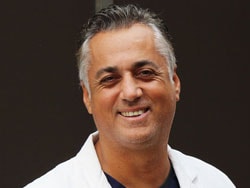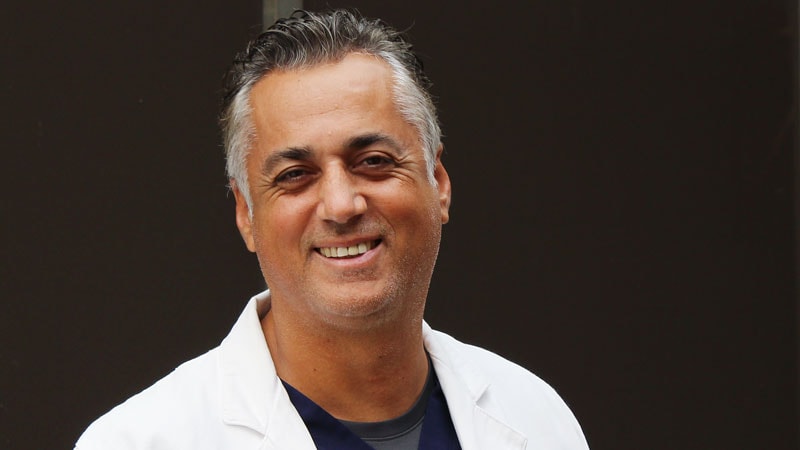Thomas Yadegar, MD, a pulmonary, critical care, and sleep specialist, has spent the last 2 years steeped in the grueling pandemic, taking care of fatally ill COVID-19 patients, befriending them, and offering a source of comfort in their final moments.

Dr Thomas Yadegar
In honor of his dedication, Yadegar, the medical director of the intensive care unit at Providence Cedars-Sinai Tarzana Medical Center in Los Angeles, California, recently received the 2020 Murray Mazur Physician of the Year Award for his service. The award is given to physicians who are seen as role models by their peers and also acknowledges the recipient’s commitment to medicine. Yadegar was chosen out of 900 physicians and was the 13th recipient.
It happens that Mazur himself was a former colleague of Yadegar’s and eventually was cared for by Yadegar himself when he became fatally ill.
“It was incredibly humbling [to receive the award],” he said. “It was also more special because I knew Dr Mazur. He was one of our orthopedic doctors who was incredibly involved in our medical staff. He cared deeply about patients in our community. Not only was he a colleague and a friend, but he was someone that I got to take care of as well. It was validation from the community for what had been done. It made everything turn full circle.”
For Yadegar, the award was a confirmation of the passion, long nights, and heart-wrenching stories he has accumulated throughout the last 2 years.
Some moments Yadegar witnessed in the ICU are hard to shake: “We were seeing a lot of young, healthy patients ending up with respiratory failure and on ventilators and dying. It’s always obviously traumatic to lose any patient, but especially someone that is younger than yourself and in the prime of their life,” he told Medscape Medical News. These same patients that were dying couldn’t have visitors due to COVID restrictions. Yadegar often took off his gloves and held these patients’ hands, so they would know they weren’t dying alone.
Yadegar appreciates the acknowledgment of the sacrifices he and many healthcare professionals like him continue to endure. “In the first few months, I didn’t see my parents,” says Yadegar. “I had a conversation with my wife about whether I should come home at night or just rent a hotel room. I think every single one of us thought of our own mortality,” he says. “It’s been incredibly traumatic. I think last winter was the worst 3 months of my life.”
The staff at Providence Cedars-Sinai has weathered never-ending waves of sick patients. “A lot of the hospitals around us, their ERs closed. Our ER stayed open. We were getting patients who had been to other hospitals, gotten discharged, then got sicker,” said Yadegar. “Our ICU had maybe one or two patients a day with COVID from March to December 2020. All of a sudden it went to 40 patients, all with COVID, all on respirators.”
“I Was Trying to Be My Patients’ Advocate”
Those closest to Yadegar have noticed changes in his demeanor since the pandemic started. Katherine Jacobson, a medical student at St. George’s University and Yadegar’s assistant of 6 years, said she saw a change almost immediately in his personality. “There was a change in how he was practicing medicine,” she told Medscape Medical News. “Before [the pandemic] he was someone who had a lot of administrative duties and that wears on doctors from what I’ve seen. Then, he focused on patient care to the point where it was haunting him.”
The lack of contact between patients and their loved ones is, as Yadegar believes, the source of the most emotional damage.
It was difficult to explain to patients’ loved ones why they couldn’t visit, even though Yadegar frequently pleaded their cases to his chief nursing officer. “There are many times that I made her cry with the stories,” he said. “I was trying to be my patients’ advocate and trying to get her to approve of the family members to come in and say their goodbyes.” But allowing a patients’ loved ones was not an option. Instead, Yadegar and his staff took on that role, serving as the conduits for Zoom goodbyes and being present as patients passed on among strangers.
What weighed on Yadegar the most was knowing he couldn’t save everyone that was in his care. “The surge we had last winter, that hit him very hard,” said Jacobson. Yadegar was simultaneously involved in direct patient care while also being looked to for guidance within the medical community. Yadegar found himself navigating between two dark worlds: consoling and tending to suffering patients while simultaneously leading his team through the daily tragedy of the pandemic.
“The pandemic has definitely been a unifying experience for direct patient care providers,” said Jacobson, when asked about the bond between doctors, nurses, and other team members. Yadegar feels the same way, though the bond he shares with his team comes from many hours spent in the thick of grief, and the additional weight placed on them not only as healthcare professionals but also as a source of hope for patients. “There isn’t a single one of us that doesn’t have PTSD. There weren’t any of us who didn’t sit in their car and cry for what seemed like hours before we went home,” said Yadegar.
It’s difficult for Yadegar to explain just how traumatic this experience has been for him and his team. He has tried talking with family to vent but, “essentially it’s like being in the trenches, so if someone’s not in the trenches with you, they don’t understand what you’re going through.”
The frustration has only multiplied with the lack of progress being made during the pandemic, and that there seems to be no resolution with vaccinations, as well as medical supplies.
“At this point, 2 years into this pandemic, testing and therapy should be second nature,” said Yadegar. He’s had to tell a lot of patients that, even though he knows what certain pharmacies should have, the prescriptions they need might not be available. “We’ve given our heart and soul for the past 2 years to try and take care of our patients. The fact that these simple logistical issues are not being resolved, it makes you not want to get out of bed. It’s incredibly demoralizing,” he said.
But Yadegar and the rest of the ICU team do get out of bed each morning, rising to the occasion in a way that seems superhuman.
“Medicine is definitely a noble profession,” says Jacobson. Many of the patients admitted for COVID symptoms had arrived past the point where the doctors and nurses could properly care for them. Jacobson observed how when Yadegar knew there wouldn’t be much time with these patients, there was a shift from needing to treat someone’s disease to an attempt to treat their spirit.
Through simple acts of humanity, like holding hands, Yadegar and his team have done all that they can to care for their patients. “That in and of itself is one of the more profound things of being a doctor,” says Jacobson.
For more news, follow Medscape on Facebook, Twitter, Instagram, YouTube, and LinkedIn

